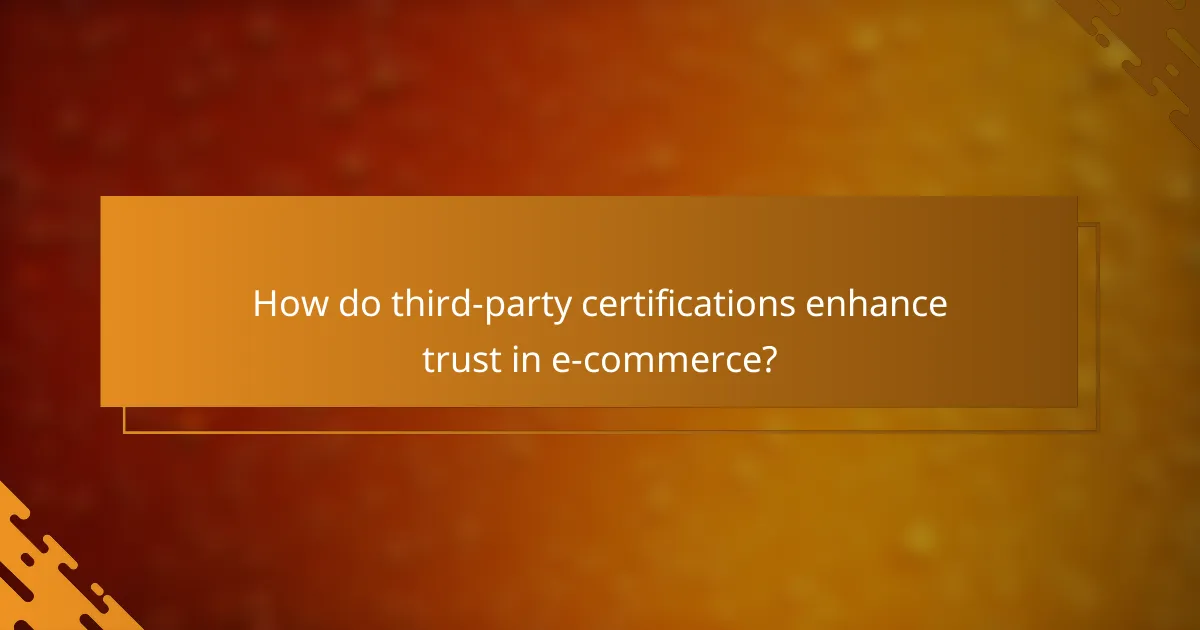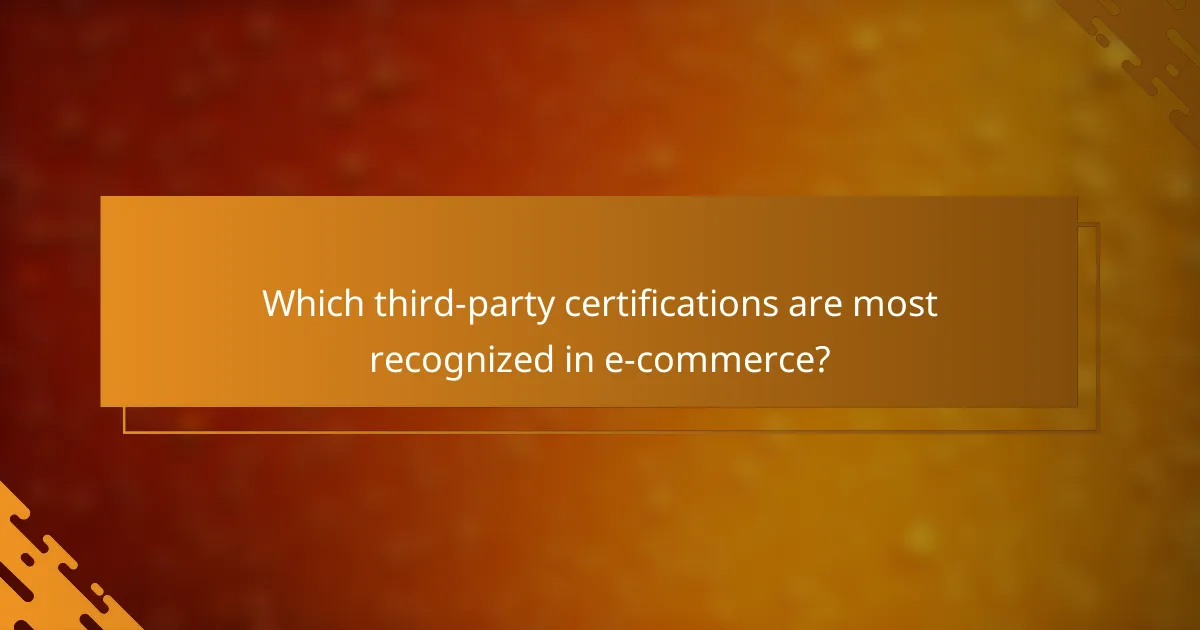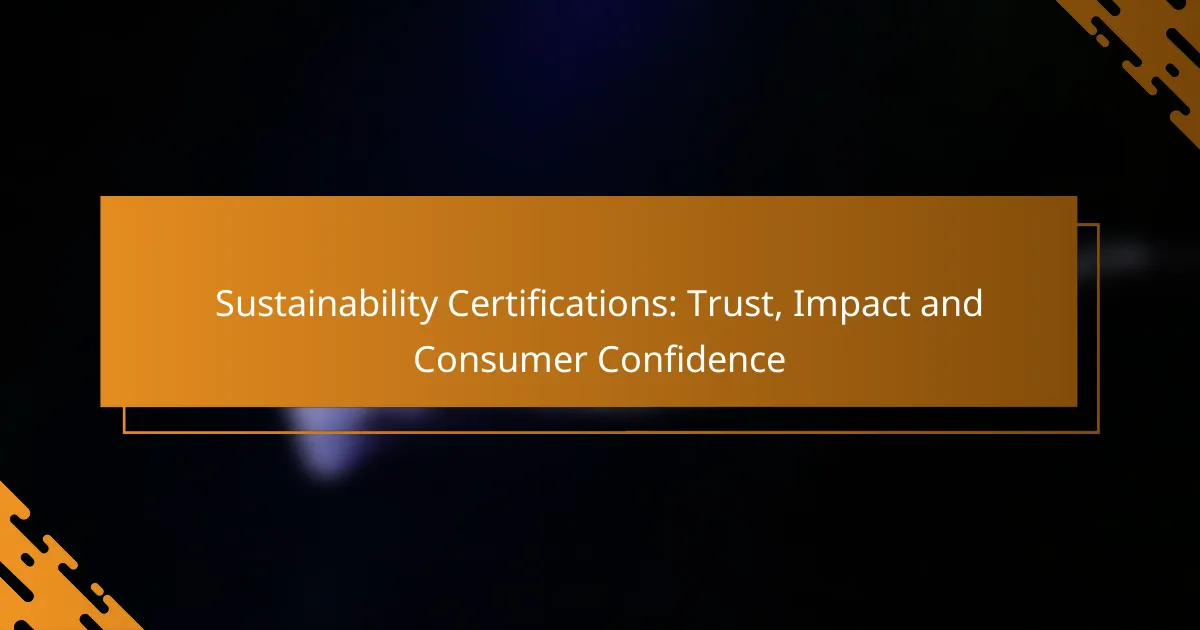Third-party certifications play a crucial role in enhancing consumer trust in e-commerce by offering independent verification of product quality and safety. By ensuring that products meet established standards, these certifications reduce uncertainty and foster confidence in purchasing decisions, ultimately influencing consumer behavior positively.

How do third-party certifications enhance trust in e-commerce?
Third-party certifications enhance trust in e-commerce by providing an independent verification of product quality and safety. These certifications assure consumers that products meet specific standards, reducing uncertainty and fostering confidence in their purchasing decisions.
Builds consumer confidence
Third-party certifications build consumer confidence by validating claims made by sellers. When a product carries a recognized certification, it signals to buyers that it has undergone rigorous testing and meets established standards.
For example, certifications like ISO or CE mark can indicate compliance with international safety and quality standards, making consumers more likely to trust and purchase those products.
Ensures product quality
Certifications ensure product quality by requiring manufacturers to adhere to specific guidelines and practices. This process often involves regular audits and inspections, which help maintain high standards throughout production.
For instance, organic certifications in the food industry guarantee that products are produced without harmful chemicals, assuring consumers of their quality and safety.
Reduces perceived risk
Third-party certifications reduce perceived risk by providing evidence that a product is reliable and safe to use. When consumers see a certification, they feel more secure in their purchase, knowing that the product has been evaluated by an impartial entity.
In e-commerce, where buyers cannot physically inspect products before purchase, certifications serve as a crucial trust signal, helping to alleviate concerns about fraud or subpar quality.

What are the benefits of third-party certifications for consumers?
Third-party certifications provide consumers with assurance regarding the quality and safety of products. These certifications help to establish trust, ensuring that products meet specific standards and regulations.
Increases product transparency
Third-party certifications enhance product transparency by providing independent verification of claims made by manufacturers. This means that consumers can access reliable information about product ingredients, sourcing, and manufacturing processes.
For example, a food product certified organic must adhere to strict guidelines, allowing consumers to make choices aligned with their values. Transparency helps consumers understand what they are purchasing, reducing uncertainty.
Facilitates informed purchasing decisions
With third-party certifications, consumers can make more informed purchasing decisions based on verified information. Certifications often highlight specific attributes, such as sustainability or safety, which can influence consumer choices.
For instance, a product labeled with a safety certification can reassure consumers about its reliability, while eco-labels may attract environmentally conscious buyers. This clarity helps consumers align their purchases with their personal preferences and values.
Enhances brand reputation
Brands that obtain third-party certifications often see an improvement in their reputation. Certifications signal to consumers that the brand is committed to quality and ethical practices, which can foster customer loyalty.
For example, a company with a fair trade certification may appeal to consumers who prioritize ethical sourcing. As a result, brands can differentiate themselves in competitive markets, potentially leading to increased sales and customer trust.

Which third-party certifications are most recognized in e-commerce?
In e-commerce, several third-party certifications are widely recognized for ensuring product quality and safety. These certifications help build consumer trust and can significantly influence purchasing decisions.
ISO certifications
ISO certifications, particularly ISO 9001 for quality management and ISO 27001 for information security, are crucial in e-commerce. They demonstrate adherence to international standards, enhancing credibility with customers and partners.
Businesses seeking ISO certification must undergo a rigorous assessment process, which includes documentation, audits, and continuous improvement practices. Maintaining certification requires regular reviews and updates to processes.
UL certification
UL certification is vital for products that require safety testing, especially in electronics and appliances. It indicates that a product has been tested for safety hazards and meets specific performance standards.
To obtain UL certification, manufacturers must submit their products for testing and comply with UL’s safety guidelines. This certification can enhance marketability, as consumers often look for UL marks as a sign of reliability.
CE marking
The CE marking is essential for products sold within the European Economic Area (EEA). It signifies that a product meets EU safety, health, and environmental protection standards, allowing for free movement within the market.
To achieve CE marking, manufacturers must conduct a conformity assessment and compile technical documentation. This process ensures that products are safe for consumers and compliant with EU regulations, which can be a significant selling point in the European market.

How can businesses choose the right third-party certification?
Businesses can choose the right third-party certification by assessing the relevance of the certification to their industry, evaluating the authority of the certifying body, and considering customer expectations. These steps ensure that the certification aligns with both operational goals and market demands.
Assess industry relevance
When selecting a third-party certification, businesses should first determine how relevant it is to their specific industry. Certifications that are widely recognized within a sector can enhance credibility and marketability.
For example, a food manufacturer might seek certifications like ISO 22000 for food safety, while a software company may pursue ISO 27001 for information security. Choosing a certification that resonates with industry standards can significantly impact customer trust.
Evaluate certification authority
It’s crucial to assess the authority of the organization providing the certification. Reputable certifying bodies often have established credibility and are recognized by industry peers.
Businesses should look for certifications from organizations accredited by national or international standards bodies, such as ANSI in the United States or UKAS in the United Kingdom. This ensures that the certification process meets rigorous standards and is respected in the marketplace.
Consider customer expectations
Understanding customer expectations is vital when selecting a third-party certification. Customers often look for specific certifications as indicators of quality and reliability.
For instance, consumers in the European Union may prioritize certifications related to sustainability, such as the EU Ecolabel. Businesses should conduct market research to identify which certifications are valued by their target audience, ensuring that their certification choice aligns with customer preferences.

What are the challenges of obtaining third-party certifications?
Obtaining third-party certifications can be a complex process that involves various challenges, including financial costs, lengthy procedures, and intricate compliance requirements. Organizations must navigate these hurdles to achieve certification, which can impact their operations and resources.
Cost implications
The financial burden of third-party certifications can be significant, often ranging from hundreds to thousands of dollars, depending on the certification type and industry. Costs may include application fees, audit expenses, and ongoing compliance costs.
Organizations should budget for these expenses and consider the potential return on investment. For example, certifications can enhance marketability and customer trust, potentially leading to increased sales and customer loyalty.
Time-consuming processes
The process of obtaining third-party certifications can be lengthy, often taking several months to over a year. This duration includes preparation, documentation, audits, and potential re-evaluations, which can divert resources from other critical business activities.
To streamline the process, organizations can develop a clear project plan, assign dedicated personnel, and maintain open communication with certifying bodies. This proactive approach can help mitigate delays and ensure timely certification.
Compliance complexities
Compliance with the standards required for third-party certifications can be intricate, as organizations must adhere to specific regulations and guidelines. This often involves comprehensive documentation, regular audits, and ongoing training for staff.
To navigate these complexities, organizations should stay informed about relevant standards and invest in training programs. Regular internal audits can also help identify gaps in compliance before the official certification audit, reducing the risk of non-compliance issues.



